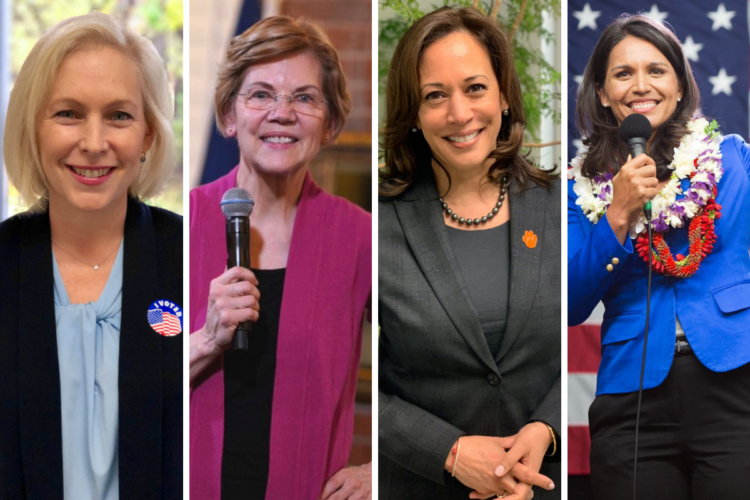
“GIRLS can’t be the president!” roared one of the boys in front of me.
My 9-year-old imagination had just suggested a pretend play idea to the group, a scenario in which I would be the President of the United States and the boys would be my army. Before this moment it had not occurred to me that I could not become Commander-in-Chief because of my gender. I had instead figured the disqualifying factor to be my status as a third grader. These boys and I had spent many an afternoon turning fallen trees into spaceships, hideout forts to spy bases, and acorns and sticks into powerful weapons used to defeat invaders and mythical creatures. But for them, a girl for president was a bridge too far.
Somehow the boys had instinctively known it was their duty to put me in my place. They did not hesitate, they all knew exactly what to do and how to do it. They tried to make me feel small, to feel less than, because I was a girl.
I balled up my fist and socked my detractor in the gut. I watched him fall to the ground, then declared I was still the army general if I couldn’t be the president, and stalked off into the woods behind my house, following the toe path to our fort. I cried once I was surrounded by the trees. All these years later, I can still feel the weight brought from the realization that as a girl, I had arrived to this world with a pre-packaged patriarchal expectation of who I can and cannot be.
During a more recent afternoon, and in far more refined company, my lunch companion and I were brainstorming names of local women we could invite to be the guest speaker at an upcoming fundraising event for the organization I work for, Girl Scouts of the Desert Southwest. We began to consider a woman who held public office in New Mexico or West Texas, and our list quickly grew to a dozen names of former Girl Scouts who were now local judges, Congresswomen, and a state governor.
The list made me think back to that day a group of boys said a girl couldn’t hold the highest office in our country. I told my friend the story about the boys mocking my idea of a female president all those years ago. In the quiet confidence that sits with older women, she simply smiled at me and tapped our list. She had been waiting for change even longer than I had.
Those boys from my childhood are now grown men, several with wives and daughters of their own, whom I presume are reading headline after headline of the unprecedented number of women elected to Congress during the recent midterms. Even more women headed historic races for governor, and took seats in state houses across the nation. Nancy Pelosi just ran Washington, D.C. like a boss during a history-making government shutdown. And in the past week, the airwaves have been full of stories of accomplished and qualified women from the Senate declare their candidacies for President of the United States of America.
The upcoming presidential election is looking to be a watershed moment. While certainly not the first women to seek the nomination from a major party, the field of female candidates is remarkable both in size and scope. Kamala Harris, Kirsten Gillibrand, Elizabeth Warren, and Tulsi Gabbard have all tossed their hats into the ring. A decision from Amy Klobuchar is expected soon. Can someone please get Stacy Abrams on the phone?
If the other side of the aisle from these women is paying attention, we may see a GOP woman or two step up to the podium. 2020 may even bring us two women at the top of a ticket when our two parties hold their conventions.
When Hillary Clinton sought the Democratic nomination in 2008 she said, “I am not running as a woman. I am running because I believe I am the best qualified and experienced person.” Eight years later she would again take the stage, this time wearing Suffragist-white while she unapologetically proclaimed she was there to “shatter that highest, hardest glass ceiling.”
The women in the field for 2020 are demonstrating there is no lane they feel they have to stay in, as campaign announcements were made from family kitchens to alma matters to decorated podiums. These campaigns are centered on class and the restoration of an affordable American Dream, on race and injustice, on foreign policy and world standing, on a track record for women’s rights.
These candidates are using the grit earned during their experiences from motherhood, service in the Armed Forces, courtroom, and the Senate floor. Even the branding of their campaigns is unique, with Gillibrand doubling down by using motherhood as a campaign cornerstone and pink in her color palette. Harris is using a yellow that is a nod to Shirley Chisholm’s bid, who declared her intention to run for President exactly 47 years ahead of Harris’ announcement. Had she been elected, Chisholm would have been the first Black woman to hold the office. Nearly a half century later, perhaps it will be Harris who breaks that barrier.
I am here for this. It is one thing to be told while growing up that “you can be anything you want to be, even the President of the United States!” It is another thing to see it unfold as a truth. Hillary Clinton’s electoral college loss, which remains under investigation, brought protestors into the streets for the Women’s March by the millions. Two years later, an estimated 730,000 people marched in over 300 locations. Bread and roses, pickets and posts, this momentum is not going quietly away.
And little girls are paying attention. For them, the path through the woods will have been made that much wider by Hillary, Kamala, Kirsten, Tulsi, and Elizabeth. The candidacies of these women, like the several who went before them, validates that girls do indeed run for President. For women and girls in America, we understand this year upcoming election could finally be that one that shatters the ultimate glass ceiling above our heads.
These days I no longer run feral through the woods with a gang of boys, wielding stick swords as we rush into battle. The main boy in my life today is my 10-year-old son. While writing this, I turned to him and asked, “Do you think there will ever be a woman who is the President?”
“Probably,” he answered with sincerity and simplicity.
Yes, probably.


Grok Nation Comment Policy
We welcome thoughtful, grokky comments—keep your negativity and spam to yourself. Please read our Comment Policy before commenting.